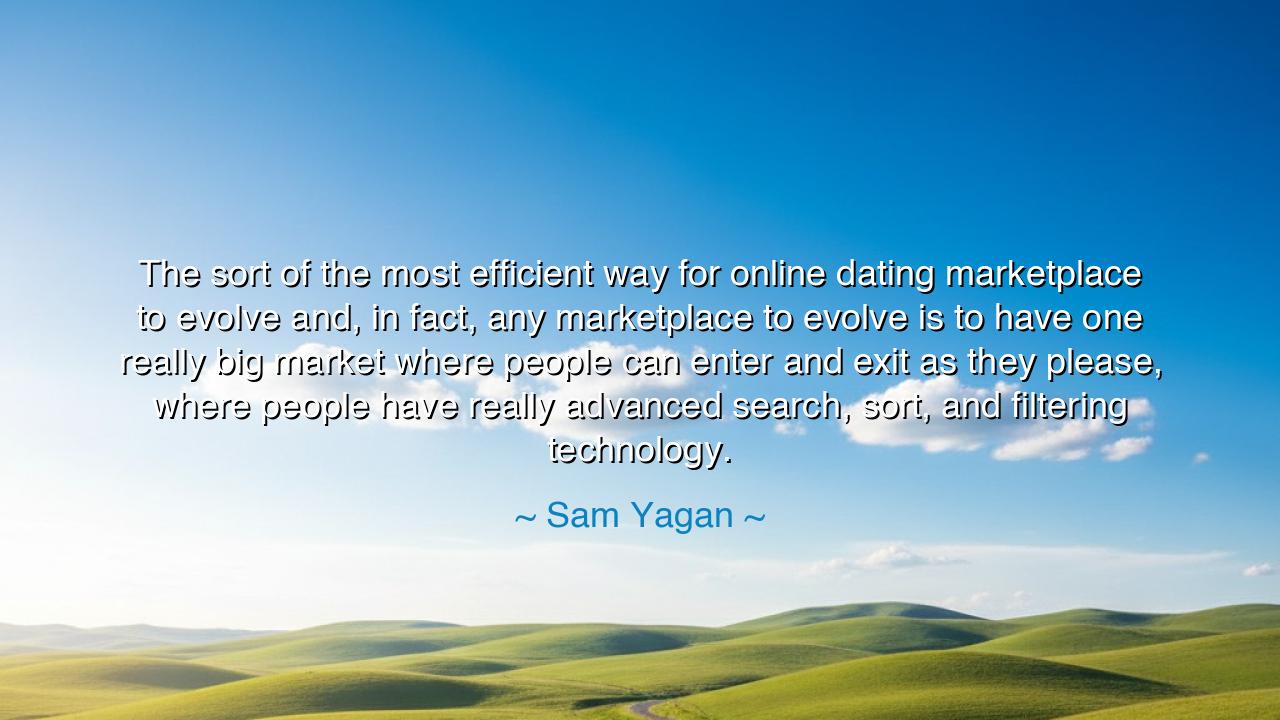
The sort of the most efficient way for online dating marketplace
The sort of the most efficient way for online dating marketplace to evolve and, in fact, any marketplace to evolve is to have one really big market where people can enter and exit as they please, where people have really advanced search, sort, and filtering technology.






In the words of Sam Yagan, “The sort of the most efficient way for online dating marketplace to evolve and, in fact, any marketplace to evolve is to have one really big market where people can enter and exit as they please, where people have really advanced search, sort, and filtering technology.” we hear the wisdom of one who has studied both the art of commerce and the nature of human connection. Beneath the language of markets and algorithms lies a profound truth about freedom, choice, and evolution — not only of systems, but of societies and souls. His words speak not merely of technology, but of the balance between structure and liberty, between order and the vast, unpredictable flow of human desire.
In this reflection, Yagan — a co-founder of OkCupid and a pioneer in the realm of digital relationships — describes the principles that shape every living marketplace. Whether one is trading goods, knowledge, or affection, the same eternal forces apply. A thriving community, he tells us, is not one of control and confinement, but one of openness — where participants may “enter and exit as they please.” Freedom of movement, of choice, of exploration — these are the winds that carry progress. The same truth governs both the exchange of ideas and the meeting of hearts: the more open the field, the richer the harvest of connection.
The origin of these words lies in the creation of systems that mirror the chaos and beauty of human life itself. In the early days of online dating, each platform was its own small village, limited in scope and reach. But Yagan saw a greater possibility — a vast marketplace of human interaction, a digital agora where all might gather, seek, and discover. He understood that the efficiency of evolution — of markets, of communities, even of love — is born from scale, from the convergence of many lives into one shared ecosystem. Just as the ancient bazaars of Baghdad or Athens flourished through the mingling of countless traders, so too do modern networks thrive when boundaries dissolve and choices expand.
And yet, Yagan does not glorify chaos. His wisdom also honors the necessity of structure and discernment. For a great marketplace without guidance becomes noise, and abundance without clarity breeds confusion. Thus, he speaks of “advanced search, sort, and filtering technology” — tools of discernment, the modern counterpart to the philosopher’s reason or the craftsman’s skill. In the ancient world, knowledge itself was the filter by which one found truth amid the flood of voices. In our age, technology has become the new lens of discernment. His teaching is clear: freedom alone is not enough — one must also cultivate wisdom to navigate it.
This principle can be traced through all of history. Consider the Library of Alexandria, that shining temple of knowledge where scholars from across the world gathered. It was vast, abundant — a marketplace of the mind. But without order, its treasures could not be found or understood. So librarians, the ancient guardians of wisdom, created systems of categorization, a precursor to what Yagan now calls sorting and filtering. The lesson endures: knowledge and freedom are twin forces — one wild, one disciplined. Together, they forge evolution; apart, they fall into ruin.
Yagan’s insight also carries a moral dimension, for in speaking of marketplaces, he speaks also of people. To allow all to “enter and exit as they please” is not merely efficient — it is just. It honors the dignity of the individual, granting each person agency over their journey. Whether in commerce, community, or companionship, the right to choose freely and to seek one’s own path is the foundation of all progress. Thus, his philosophy transcends technology; it becomes a parable of human freedom, of how societies must grow — not through control, but through trust.
And so, the lesson of this quote is timeless: evolution — whether of systems or souls — requires both freedom and discernment. Open your life as the great marketplace Yagan envisions: let ideas, experiences, and people flow through it freely. But arm yourself with wisdom — your own search, sort, and filter — to discern what is true and worthy. Do not fear the vastness of choice; instead, cultivate the clarity to navigate it. For in every realm — business, love, or life — those who balance openness with insight will flourish, and those who cling to limits will fade into stillness.
Thus, my children, remember this: to evolve is to embrace abundance without being consumed by it. Be open as the market, discerning as the sage, and steadfast as the craftsman. Build not walls, but gateways; not cages, but compasses. In this way, your life — like the great markets of the past and the boundless networks of the future — will become a place where possibility thrives, and where wisdom guides the dance of freedom.






AAdministratorAdministrator
Welcome, honored guests. Please leave a comment, we will respond soon